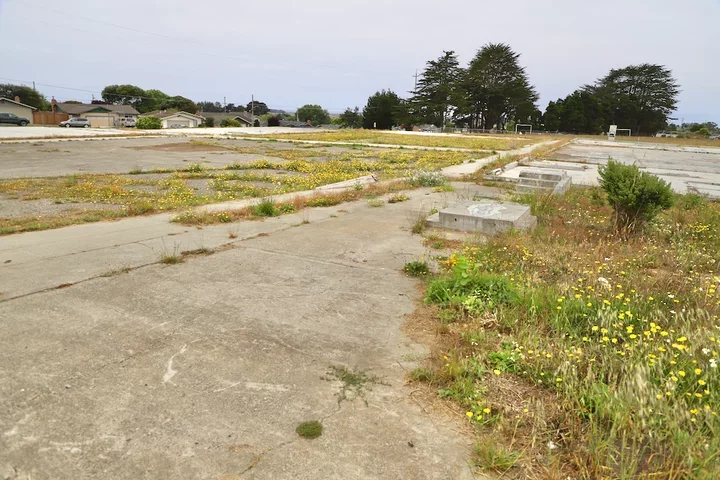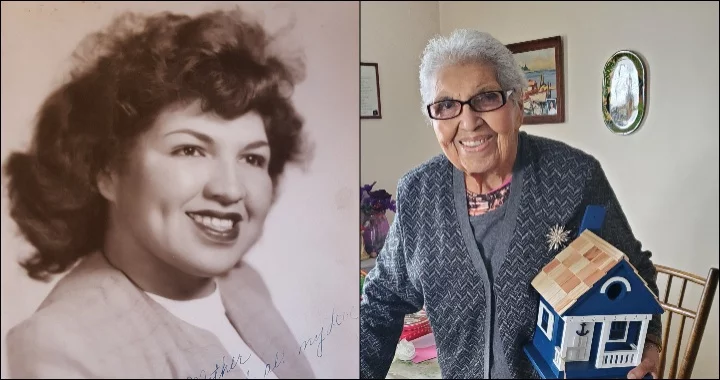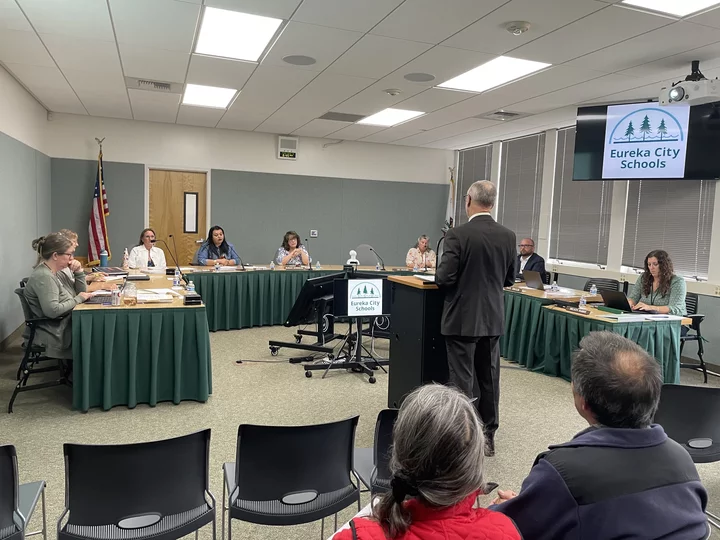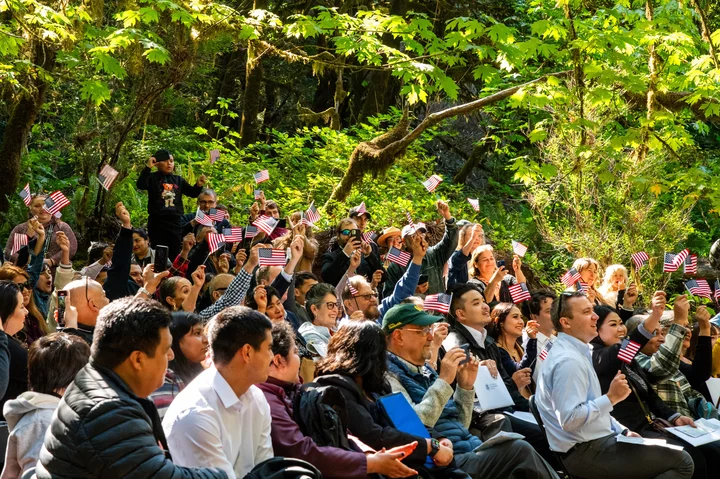Anonymous AMG Communities Confirms Death of Jacobs Campus Deal, Vows to Try Again After Election Results
Ryan Burns / Friday, Aug. 9, 2024 @ 1 p.m. / Housing , Local Government
The vacant former Jacobs Middle School property. | File photo by Andrew Goff.
PREVIOUSLY: Eureka City Schools’ Deal With Mystery Developer for the Jacobs Campus is Dead
###
With just hours left before the scheduled close of escrow — and half a day after the Eureka City Schools Board of Trustees declined a request for another delay in completing the deal — the anonymous corporation AMG Communities - Jacobs, LLC, issued a statement saying it was actually their idea to back out of the land exchange agreement.
The statement, which was sent in response to emailed questions from the Outpost, goes on to accuse the City of Eureka of working to actively repel affordable housing development.
Back in January, Gov. Gavin Newsom designated Eureka as one of 37 “Prohousing” communities in the state, officially recognizing the city’s efforts to cut red tape and speed up housing approvals. A month later, Attorney General Rob Bonta lauded city leaders for acting “swiftly and fiercely” to address the housing crisis and climate crisis through its plans to convert downtown parking lots into apartment complexes.
When reached by phone, Eureka City Manager Miles Slattery said that AMG’s allegation that the city is to blame for this deal falling through is false.
“That is the most laughable statement I’ve heard from any agency in a very long time,” he said.
Slattery insisted that, if anything, city staff members went out of their way to expedite AMG’s request to rezone the former Jacobs Middle School property. The Eureka City Council approved a “Mixed Neighborhood” overlay zone for that property in April.
“We made sure we did everything in our power to make this happen,” Slattery said of the rezone request.
Here’s the statement from AMG:
###
AMG Communities has decided to withdraw from the exchange agreement with Eureka City Schools for the former Jacobs Middle School property, and to wait until the passage of Measure F, the Housing for All and Downtown Vitality Initiative, on the November ballot to reconsider purchasing the property if it is still available at that time.
We sought this property and were willing to make a substantial investment in the community because we believe the community supports the construction of badly needed housing at this site. Our investors were willing to pay an above-market price for the property in order to provide as much benefit as possible to the School District.
However, the strident opposition of several City officials, including certain members of the City Council, to efforts to rezone this site for family housing has created a political climate that is too risky for the size of investment needed to bring our vision for the Jacobs site into reality.
With a few exceptions in southern California, nearly every city in the state is working hard to attract developers interested in providing housing that is affordable to average working residents. The City of Eureka, by comparison, has been working hard to repel this type of investment. That is unfortunate and a loss to City residents.
###
NOTE: This post has been updated from its original version to include comments from Slattery.
BOOKED
Yesterday: 11 felonies, 7 misdemeanors, 0 infractions
JUDGED
Humboldt County Superior Court Calendar: Yesterday
CHP REPORTS
No current incidents
ELSEWHERE
RHBB: Search Continues After Man Disappears While Swimming Off Crescent City Beach
RHBB: Prescribed Burn Planned Near Redwood Creek Along Highway 299
RHBB: Arcata Fire District: Fire on the Square Ruled Undetermined, No Evidence of Arson
RHBB: Caltrans District 1 Lists Extensive Roadwork and Emergency Projects Across Northwest California
In Letter to Industry Colleagues, Sun Valley Floral Farms CEO Explains the Factors That Led to the Company’s Demise
LoCO Staff / Friday, Aug. 9, 2024 @ 11:33 a.m. / Business
Sun Valley Floral Farms greenhouses in Arcata. | File photo by Andrew Goff.
###
PREVIOUSLY: Sun Valley Floral Farms Issues Layoff Notices to Entire Workforce in Arcata and Oxnard
###
Longtime Sun Valley Group CEO Lane DeVries recently sent the following message to his colleagues in the floral industry explaining the factors that led to the recent closure of the company and the elimination as many as 700 local jobs.
A Message from Lane
August 2024Dear Floral Industry friends,
Now that the news of Sun Valley closing has reverberated through the floral industry and our local community, I would like to take this opportunity to reflect on good times, but also the journey through the dark valley.
I wish to express my gratitude to the fantastic team we had in our company with dedicated team members. The Sun Valley team spirit and the agility of the Sun Valley team have been a cornerstone and integral to the success of the company throughout the years. It was incredibly painful to say goodbye to this wonderful team in the last 2 months.
The sense of being a Sun Valley family was at the core of our company culture. We had fun building this company with a mission to make a difference and leaving a legacy of a commitment to quality in product and service and advancing the American floral industry at large.
Thank you to our customers and industry friends, many of you have sent messages, emails and phone calls, we very much appreciate these expressions of concern and comfort.
Originally Sun Valley started in 1948 in Southern Oregon, and the company has been doing business in Humboldt County California for 65 years. I have been blessed to be part of this great company since i arrived here in January of 1984.
In the last 40 years, Sun valley went through a period of phenomenal growth. The Sun Valley team continued to expand, and many customers across the USA were eager to buy our flowers. Meanwhile Sun Valley’s involvement in the local community, and its employment base of over 400 team members, were a vital part of the North Coast economy.
Starting 16 years ago our company encountered several serious setbacks:
For instance, in 2008 we lost 75% of our workforce in Arcata due to an immigration action by the government. The ensuing domino effect on operations lasted for nearly 18 months and left the company with a huge financial hole, and lasting scars.
In 2019 “FTD/Proflowers” one of Sun Valley’s largest customers at the time, filed for bankruptcy right after Mother’s Day and several million dollars never were paid. The pandemic in the Spring of 2020 left us with millions of flowers blooming in the greenhouses.
At the same time business conditions in California have made operating a greenhouse flower company very challenging.
The rising cost due to a series of rapid minimum wages increases, and the phased-out elimination of the agricultural overtime exemption has seriously raised the company’s unit cost in recent years.
Insurance expenses have quadrupled in the last 5 years. Natural gas costs have gone up dramatically and electricity expenses have nearly tripled in the last 10 years.
These cumulative factors had a dramatic impact on our competitive position in the marketplace. In many cases our customers were unwilling to accept price increases needed to offset the cost increases.
These conditions have put the company deeper into debt and with the current interest rates, it has deteriorated the financial state of the company.
As owners we reached the point of having difficulty seeing a viable way out on our own accord.
In the last 12 months the company has searched for a suitable investor or a buyer for the entire business. While there were some leads, no buyer for the entire company materialized.
This left us at the point of closing the doors, many have asked what all this means to the supply of core Sun Valley crops.
We are pleased to announce that Continental Floral Greens has assumed the leases of the Willow Creek farm. This assures the continuity of the well know Sun Valley crops like “Spirit Series” Ilex, Rosehips, Cotinus, Snowberries Flowering Cotinus and Snowball Viburnum.
The other core Sun Valley crop that will continue are the Butterfly Ranunculus, and possibly Iris, Continental Floral Greens will be growing these at their Watsonville location.
After finishing winding down Sun Valley, I will be involved in an advisory and consulting capacity to Continental Floral Greens to lend my experience in growing and bringing these crops to the marketplace. Tim Crockenberg, Sun Valley’s lead grower will also come on board.
Many of you know that I’m a man of faith and I trust that our Lord has a plan, and good things are in store for those who believe.
Thank you for all the kind words, prayers, emails and calls of support and encouragement.
I know it is hard to accept but I trust there will come a time that all of it starts making sense.
Thank you and God Bless you,
Lane
Republicans Target Kamala Harris’ ‘California-Ness.’ Do Swing-State Voters Care?
Yue Stella Yu / Friday, Aug. 9, 2024 @ 7 a.m. / Sacramento
Vice President Kamala Harris and Minnesota Gov. Tim Walz walk on stage at during Harris’ presidential campaign rally at the Detroit Metropolitan Wayne County Airport in Romulus, Mich., on Aug. 8, 2024. Photo by Larry Valenzuela, CalMatters/CatchLight Local.
A pair of ceiling fans spun lazily inside the jam-packed hangar as the sun blazed down on thousands of supporters outside. As the crowd of 15,000 — the largest of the 2024 Democratic presidential campaign — waited for Vice President Kamala Harris, some began to faint.
That didn’t stop the supporters from bursting into waves of deafening cheers that lasted two minutes as Harris took the stage. It was what her new running mate, Minnesota Gov. Tim Walz, called a “warm Midwestern welcome.”
“OK, come on, we’ve got business to handle,” she finally said.
The rally outside Detroit on Wednesday afternoon marked the third stop on a five-day, cross-country tour to woo voters in battleground states, which began in Pennsylvania when Harris introduced Walz as her vice presidential pick. The duo plan events in North Carolina and Georgia before rallies tonight in Arizona and Saturday in Nevada. The Harris campaign has jolted the Democratic base in the three weeks since President Joe Biden dropped out and endorsed her, bringing in record amounts of money and drawing massive audiences.
Although California has sent three Republicans to the White House, it has never produced a Democratic president. Several tried — including former Gov. Jerry Brown, whom critics nicknamed “Governor Moonbeam,” and Harris herself in 2019. Some political strategists blame the sorry track record in part on the Golden State’s liberal image.
Can Harris finally break through in 2024?
To reach the White House, she may need to overcome any California-ness qualms, and must aggressively defend her California record against intense attacks from former President Donald Trump’s campaign. In a new 1-minute ad released Thursday, Harris leaned heavily into her Oakland upbringing and her California prosecutor career. She also agreed to the first debate with Trump, on Sept. 10.
Harris’ California roots are already under attack. Labeling her as a “California radical” and “San Francisco liberal,” Republicans have hammered her stances, particularly on crime and immigration. Sen. JD Vance of Ohio, the GOP nominee for vice president, is trailing Harris’ travels this week and holding press events to criticize her. Trump told reporters at Mar-a-Lago on Thursday: “She destroyed the state of California along with Gov. Gavin Newscum,” he said, using his pejorative for Newsom.
Harris has backed away from some of her more liberal campaign promises from 2019 and no longer supports a fracking ban or a single-payer health care system. But she must also navigate criticism from progressive Democrats, who want her to go further than Biden on abortion and climate policies.
Her California ties have given some undecided voters pause, but those connections are likely not the deciding factor, according to 20 voters, consultants, officials and political experts interviewed by CalMatters in some of Michigan and Arizona’s most purple districts. And some voters and experts argued that Walz’ Midwestern roots could help balance the ticket.
“People will understand through the Walz lens that Kamala, it doesn’t matter where she’s from geographically,” said Democrat Carl Marlinga, who is running for Congress in Michigan’s competitive Macomb County. “Maybe she says things a little differently, but she wouldn’t have picked a guy like us if she didn’t want to connect with people like us.”
Growing up Republican in Michigan, Michael Taylor knows well a common Midwestern conservative sentiment toward California: His mother often told him the state is a “hellscape” detached from the rest of America, with rampant crime, illegal migrants and unfettered homelessness — even though he said he disagrees.
“There’s a lot of … media portrayal that the West Coast liberals are just out of touch and don’t really know what’s going on in the heartland,” said Taylor, mayor of Sterling Heights since 2014.
His blue-collar city of 132,000 is home to four automotive assembly plants. Thursday, Harris spoke at a Detroit rally hosted by the United Auto Workers, which endorsed her last week, citing her “proven track record of delivering for the working class.”

Michael Taylor, mayor of Sterling Heights, outside his office at City Hall in Sterling Heights, Mich., on Aug. 6, 2024. Photo by Larry Valenzuela, CalMatters/CatchLight Local
Sterling Heights is in Macomb County, the quintessential swing county where disillusioned Democrats ditched their party for Republican President Ronald Reagan in the 1980s. The county went for Democrat Barack Obama twice before favoring Trump in 2016 and 2020. Taylor, who now identifies with neither major party, supported Trump in 2016 but voted for Biden in 2020.
California is perceived as elitist and progressive and seems distant to a lot of Macomb County voters, sometimes even himself, Taylor said.
“I sense that from talking to Republicans. There’s this conflict between the real America and the America of the little blue islands along the coasts,” he said. “When you talk to some people, they almost act like California is a different country.”
That’s true for Republican Cheryl Costantino, a teacher in Macomb County’s Shelby Township: “To us, California is like its own weird, liberal place where people poop on the sidewalks and live in tents.”
McClellan Grote, a registered independent and nuclear engineer from Gilbert, Arizona, hesitates to vote for Harris. Although he supported Trump twice and still favors his policies, Grote said he must vote against Trump’s vitriol. But he’s reluctant to support Harris, partly due to the liberal image of California and Newsom, who Grote also calls “Newscum.”
That perception represents a “key vulnerability” that Harris must overcome to win moderate voters, said Matt Grossmann, a political science professor at Michigan State University. Historically, Black and female candidates are considered more liberal than white men, he said, and Harris’ history representing a largely Democratic state, particularly in the U.S. Senate, may cement that impression.
Republicans are hoping to cash in on that exact sentiment. In a National Republican Senatorial Committee memo, executive director Jason Thielman deemed Harris a “radical” from San Francisco.
While it’s too soon to tell if those attacks have dented her support, Grossmann noted that down-ballot Democrats in swing states have suffered in previous elections when tied to former House Speaker Nancy Pelosi of San Francisco. “That gives (us) a reason to expect that the same attacks would be successful against Harris,” he said.
The person who may help counter those critiques is Walz, whom Democrats are counting on to help connect with Midwesterners with his rural roots and his background as a gun owner, hunter, public school teacher and veteran. The Trump campaign, on other hand, quickly tried to paint Walz in an emailed statement as a “West Coast wannabe” who wants to spread “California’s dangerously liberal agenda.”


First: Minnesota Gov. Tim Walz speaks to the crowd at a campaign at the Detroit Metropolitan Wayne County Airport in Romulus, Mich., on Aug. 8, 2024. Last: Supporters hold up signs at the Harris/Walz campaign rally at the Detroit Metropolitan Wayne County Airport in Romulus, Mich., on Aug. 8, 2024. Photos by Larry Valenzuela, CalMatters/CatchLight Local
Walz is “a perfect description of a Democrat who could win in Macomb County,” said Marlinga, a self-described moderate Democrat who lost by a razor-thin margin to Republican U.S. Rep. John James in 2022 and is set for a rematch this November.
Marlinga called the Minnesota governor a “positive populist” who is easy-going and approachable. Walz called Trump and Vance “weird,” just like an “ordinary guy … sitting down for dinner at a deli somewhere” would, Marlinga said.
“We like conservation, we like sports, we like fishing, we like hunting,” he said. “We’re not like the Democrats in New York and California, because we’re not here to grab your guns and to change your life and to preach to you about things.”
In the Republican attacks on Harris, her record on crime is coming under intense scrutiny, as she leans into her prosecutor background in contrast with Trump — a convicted felon who was found in a separate civil case to have sexually abused writer E. Jean Carroll.
“She prosecuted sex predators. He is one,” an ad for Harris’ 2020 presidential campaign said.
Republicans are portraying Harris as a soft-on-crime prosecutor from California, especially as San Francisco is now under the national spotlight for its homelessness crisis and retail theft — so much so that even its Democratic mayor, London Breed, is backing a statewide November ballot measure to enhance penalties on petty crimes.
The Trump campaign is trying to associate Harris with previous California ballot measures that reduced penalties for petty crimes and granted earlier releases to nonviolent offenders. Voters approved those measures during her tenure as the state attorney general, even though she remained neutral on them, and her record on crime is more nuanced.
The attack resonates with some Michigan Republicans, including Robert Wojtowicz, who is running for a competitive state House seat in Macomb County.
While courting voters at a Clinton Township polling station on Tuesday, Wojtowicz associated Harris with California’s recent increases in some violent and property crimes, even though she left to serve in the U.S. Senate in 2017. He argued the state’s prosecutors “are not prosecuting … serious crimes,” echoing California conservatives who are advocating for tougher penalties.
Costantino, the Shelby Township teacher, noted that the number of violent crimes in San Francisco rose during Harris’ early years as district attorney. The city’s current struggle with crime is something Harris still should own, Costantino said.
“The fact that she’s from California should make her more sensitive to those issues, not less sensitive,” Costantino said. “Just because she goes to Washington doesn’t mean that she should be removed from them.”
“We’re not like the Democrats in New York and California, because we’re not here to grab your guns and to change your life and to preach to you about things.”
— Democrat Carl Marlinga, who is running for Congress in Michigan’s competitive Macomb County
But most of the Michigan voters interviewed by CalMatters spoke more about policies from her time as vice president, not while she served in California. While conservative voters blamed the Biden-Harris administration for increases in gas prices, illegal border crossings and national debt, Democrats celebrated her for advocating for abortion rights — an issue that turned out a historic number of Michigan voters in recent elections and helped flip the state Legislature blue.
And some Michigan voters — both Republicans and Democrats — said they did not know Harris for her time in the Golden State.
Joe Koch is a 58-year-old electric operator and a self-described “Christian conservative” in Clinton Township, where Biden won by less than 1 percentage point in 2020 after Trump won it by 4 points in 2016. He called California a “mismanaged” state, blaming Newsom for the state’s budget deficit. “He’s just a populist guy, good hair, but I don’t see him governing,” Koch said.
But Harris’ California roots are “secondary” compared to her policy stances, Koch said. “She could be from New Mexico or Washington,” he said.
Tamela Washington, a 55-year-old Democratic voter, also does not associate Harris with California. She said she only began to notice Harris when she was in the U.S. Senate.
“It doesn’t matter whether she’s from California, Hawaii, Timbuktu. Doesn’t matter. It just blinds us from … what connects us and what keeps us wanting to make this country just better every day,” she said.
Among Michigan’s Arab community, Harris’ California roots fade even further into the background.
Boasting the nation’s second-largest Middle Eastern population, Michigan is home to Dearborn, the first and the largest Arab-American majority city in America. Democratic voters here, partly angered by Biden’s support for Israel in the Gaza war, overwhelmingly voted “uncommitted” over Biden in the March primary.
During Wednesday’s rally, a small group of pro-Palestinian student protesters from the University of Michigan briefly interrupted Harris’ speech before security escorted them out. They chanted: “Kamala Kamala you can’t hide, we won’t vote for genocide!”
“It seems that the number one driving factor in this race will be the Gaza issue. People are not looking at much else,” said Qarim Abdullah, an imam at the American Muslim Center in Dearborn since 2018. A sense of “betrayal” by Biden’s Gaza policies, he said, has driven some to vote for Trump.

The American Muslim Center in Dearborn, Mich., on Aug. 5, 2024. Photo by Larry Valenzuela, CalMatters/CatchLight Local


First: A man in prayer at the American Muslim Center in Dearborn, Mich., on Aug. 5, 2024. Last: Qarim Abdullah, an Imam at American Muslim Center, stands in the prayer room of the mosque in Dearborn, Mich., on Aug. 5, 2024. Photos by Larry Valenzuela, CalMatters/CatchLight Local
And in Arizona — a traditionally-red Sun Belt state that Biden narrowly flipped in 2020 — Harris’ record on illegal immigration at the border will come into laser focus.
The Grand Canyon State’s border with Mexico makes immigration a top concern among its voters. The state’s GOP-led Legislature placed a controversial measure on the November ballot that would allow state and local law enforcement to crack down on illegal border crossings, even though courts deem it a federal power.
Harris — portrayed by Republicans as a liberal “border czar” lenient on illegal migrants — has gone on the offense, tapping into her background cracking down on transnational gang activities as California’s attorney general.
“In that job, I walked underground tunnels between the United States and Mexico,” she said at a rally in Atlanta. “I went after transnational gangs, drug cartels and human traffickers that came into our country illegally. I prosecuted them in case after case, and I won.”
But on other issues, Harris’ California brand could prove to be an advantage, especially abortion.
Arizona Democrats hope her outspokenness on abortion rights — another proposal that could also land on the state’s November ballot — appeals to independent voters and disenfranchised Republicans.
“She’s always been an advocate for women’s health care, and she’s a woman. She gets us,” Patti O’Neil, chairperson of the Maricopa County Democratic Party, said of Harris.
Harris’ support for abortion rights won over Karla Grote, a developer in Gilbert and a former Republican who re-registered as independent after becoming disillusioned with Trump.
“I don’t hate her policies. I don’t hate her thought patterns. Well, she’s pro-choice! That’s a big one for me,” Karla Grote shouted while talking to her husband at Detroit Metropolitan Airport, waiting for a delayed flight back home to Arizona.
“Anybody miss that?” McClellan asked while rolling his eyes, drawing a few chuckles from passengers nearby.
###
CalMatters.org is a nonprofit, nonpartisan media venture explaining California policies and politics.
OBITUARY: Paula Casillas Taizan, 1927-2024
LoCO Staff / Friday, Aug. 9, 2024 @ 6:56 a.m. / Obits
Paula Casillas Taizan was born in San Gabriel, California on January 25, 1927. She passed away on Wednesday, July 31 peacefully in her sleep in Eureka at age 97. She was the six child of 12 of her parents Alejandro and Trinidad Salazar.
Paula lived most her entire life in the San Gabriel Valley, where she enjoyed a large extended family of loving relatives. She had many great memories of her time in Southern California: The big family gatherings, watching her children and nieces and nephews playing sports from track and swim meets to tennis and baseball … never missing a sports competition despite her work schedule. She loved attending as many of her beloved Dodger games as possible and witnessed the pitching of Sandy Koufax, Don Drysdale and Orel Hershiser. She absolutely adored Tommy Lasorda, Vin Scully, the “penguin” Ron Cey and catcher, John Roseboro. She was a baseball fan through and through.
In her early years she had great stories of traveling north to the Gilroy/San Jose area and picking fruits and vegetables with her family. During World War II her family kept and maintained a large Victory Garden. She loved flying the U.S. flag and was very patriotic.
After high school she went to work as a house cleaner and later she worked in a plant nursery. After World War II ended, she met an Army man, Savino Casillas, who had returned home from the Battle of the Bulge in Europe. He had his own car and wore blue suede shoes. She was smitten, especially when he let her take his car on her own! They were married soon after. After the wedding, she found her true calling when she took a job as a nurse’s aide in a care home. She loved working with her patients in these homes and was often asked to become a private nurse for others that traveled. But had to decline due to her own family’s needs.
Paula and Savino had two children, Robert Paul and Martha (Marty.) Paula and Savino had a happy marriage that lasted 38 years until she lost him in 1991.
She met and married her second husband, German Taizan, on a senior casino trip. They had 20 happy years together, the last 18 of them in Eureka when they moved north to be near Marty. They were a popular pair around town and the casinos, often dressing alike.
Paula loved doing a lot of life’s important things like dancing, eating popcorn, making trays of the best cheese enchiladas, eating ice cream (and finishing other people’s ice cream). When she moved to Eureka in 2006 she was active in T.O.P.S. and really enjoyed their many social luncheons. She made friends easily and her smile always just lit up a room. She was the best mom, she worked hard and never missed birthdays, holidays or a chance to celebrate events with her family. She was a master at crocheting blankets and towels for friends and acquaintances. She constantly made blankets for the area’s care homes. She was a selfless, caring individual that immediately made you feel at ease with her genuine personality and interest in your life. She was a gift to everyone and will be sorely missed. She especially enjoyed visits from anyone, but especially her local friends Bonnie, Judy and Eloise and Virginia. And especially loved all her relatives that kept in touch with phone calls, cards and visits. It meant a lot to her.
Paula was preceded in death by her parents, Alejandro and Trinidad Salazar, her first husband, Savino Casillas, her son, Robert Paul, her siblings Jesus Salazar, Conrado Salazar, Esteban Salazar, Matilde Diaz, Catalina Martinez, Alejandro Salazar, Gilberto Salazar, Rosendo Salazar, Margarita Garcia, niece Christine Allen and nephews Gilbert Salazar Jr., and Daniel Martinez.
Paula is survived by her second husband, German Taizan, daughter Marty Casillas (Karen), brother Richard Salazar (Herminia), sister-in-law Socorro Salazar and brother Raymond Salazar. Paula also has numerous nieces, nephews, cousins and extended family. She’s also survived by German’s son, Ruben, and daughters Santana and Grisel.
She loved her life. All 97 years.
The family would like to thank the staff at Especially You for all their tender care. Prior to her stay there, she enjoyed the staff from Visiting Angels. And we’re especially thankful for the incredible team at Hospice of Humboldt. Thank you.
Services will be held on August 14 at 10 a.m. in San Gabriel at Pierce Brothers Turner and Stevens Mortuary 1136 East Las Tunas Dr., San Gabriel, CA. (626) 287 0595. She’s going home.
Cards can be sent to Marty at her home address or to P.O. Box 6732 Eureka, CA, 95502.
###
The obituary above was submitted on behalf of Paula Taizan’s loved ones. The Lost Coast Outpost runs obituaries of Humboldt County residents at no charge. See guidelines here.
Eureka City Schools’ Deal With a Mystery Developer for the Jacobs Campus is Dead
Ryan Burns / Thursday, Aug. 8, 2024 @ 7:16 p.m. / Local Government
UPDATE, Aug. 9, 1 p.m.:
The day after the Board of Trustees’ decision reported below, AMG Communities - Jacobs, LLC, issued a statement confirming the dissolution of the agreement, though the mysterious corporation says it was their idea to back out of the deal. Read the statement (and a response from Eureka City Manager Miles Slattery) here.
###
Original post:
Photo: Ryan Burns.
The Board of Directors Trustees of Eureka City Schools announced tonight that it will not agree to any further delay of the deal to sell the Jacobs Campus to a mysterious developer who promised nearly $6 million for the blighted property.
Assistant Superintendent Paul Ziegler told the board after a closed session period that “AMG Communities - Jacobs,” the anonymous corporation that had outbid the California Highway Patrol by some $2 million for the property, had asked for yet another extension to close the deal, which was first agreed to back in December 2023.
“What I will say is the district has done everything in its power to be able to close by tomorrow’s deadline,” Ziegler said, speaking of the end of the term of the most recent escrow extension. “We are poised and ready to do so. However, AMG has indicated that it is not prepared to close and has instead asked for an additional extension.”
Ziegler went on to say that it has been “a long, interesting road to get to this point” but this particular road should end here.
“AMG has had plenty of time to perform and do what it needs to do to come to the table to close, and as I said just a minute ago, they’re not prepared to do so,” he said.
Eureka City Schools Board President Susan Johnson asked for clarification.
“My understanding is that they’re asking for another fairly lengthy extension, and if we do not accept this extension, which is kind of what — which is the direction … that you’ve given us and that we’ve given you — that means that,” she stopped herself. “What does that mean? That means that this deal is is off and we’re done? What does that mean?”
Ziegler said that the agreement will almost certainly terminate tomorrow, and “by Monday morning, we have no further agreement with AMG.”
As the meeting wound down, Eureka City Schools District Superintendent Gary Storts said the potential sale of the Jacobs Campus will be brought back to the board at subsequent meetings to allow them to consider other options. The California Highway Patrol has remained in negotiations with the district to acquire the property, according to a Times-Standard story from last month.
Trustee Lisa Ollivier said the board’s goal is “to benefit our students as much as possible, and that has not changed.”
The meeting concluded shortly thereafter. Ziegler told reporters that a $100,000 deposit from AMG will be returned, per the terms of the most recent escrow extension agreement. He also said that AMG had requested another extension “out past November,” which would have put the hypothetical close of escrow beyond Election Day, on Nov. 5, when the fate of the “Housing for All and Downtown Vitality Initiative” will be decided.
To briefly recount how we got here: Last December, in a move that has been roundly condemned for its lack of transparency and due diligence, the Eureka City Schools Board of Trustees unanimously agreed to enter a “land exchange” agreement with a secretive corporation called AMG Communities - Jacobs, LLC, which had been created just two days earlier.
Per the terms of the deal, the district agreed to swap 8.3 acres of the vacant Jacobs Campus site for a 0.125-acre residential property, plus $5.35 million in cash. By organizing the deal as a land exchange rather than a standard sale, the district cleverly sidestepped California Education Code requirements for the sale of surplus property.
The agreement came as a shock to the California Highway Patrol, which had been in negotiations with the district for years to purchase the Jacobs site and convert it into a new regional headquarters. But the CHP’s most recent offer, $4 million, fell a full $2 million short of what AMG was offering.
In the nearly eight months since that deal was struck, the close of escrow has been delayed again and again, and while AMG Communities - Jacobs, LLC set up a website explaining that it’s backed by “a small investment firm” and inviting people to submit questions via email, it has steadfastly refused to identify who’s behind the corporation.
The company insists that Rob Arkley is not an owner or investor in AMG Communities, but documents turned over in response to a California Public Records Act request revealed that Arkley was involved in negotiations with Eureka City Schools in the weeks leading up to the school board’s December decision. In fact, emails exchanged prior to the deal show that district personnel, including then-Superintendent Fred Van Vleck and Assistant Superintendent of Business Services Ziegler, believed they were negotiating with Arkley’s representatives on the property exchange arrangement.
Furthermore, the few people who have been identified as working on behalf of AMG Communities have direct ties to Arkley. For example, San Diego attorney Bradley B. Johnson, who signed the Jacobs property agreement as an agent for AMG Communities and whose company, Everview Ltd., is listed in escrow documents as the purchaser of the I Street property, works extensively with Security National, the real estate mortgage servicing firm founded by Arkley.
Johnson is also the Secretary and Chief Financial Officer of Citizens for a Better Eureka, a Security National-funded political group that filed a series of lawsuits against Eureka aimed at halting affordable housing developments downtown. And Johnson is working as legal counsel for the backers of Measure F, the pro-parking ballot measure otherwise known as the “Eureka Housing for All and Downtown Vitality Initiative.”
As reported last week by Thadeus Greenson of the North Coast Journal, a woman named Sara Lee once acted as a spokesperson for AMG Communities-Jacobs LLC, and a Sacramento-based political consultant with that same name turned up on the latest “Housing for All” campaign finance disclosure forms. Security National paid her $11,192 for consulting work related to the ballot measure.
Despite these connections, Gail Rymer, a spokesperson for both Security National and Measure F, insists, “No one from Security National, the Housing for All Initiative or Citizens for a Better Eureka have any involvement with the Jacobs property swap.”
An email sent to AMG Communities - Jacobs, LLC, this morning asking about the status of the pending deal was not returned.
###
NOTE: Outpost Editor Hank Sims contributed to this report.
###
PREVIOUSLY:
- Who Will Get the Former Jacobs Campus? Bidders for Blighted Site in Highland Park Are the City of Eureka and the California Highway Patrol, With a Decision Coming Soon
- The CHP Would Like to Build New Headquarters on the Property Championed by People Opposing Downtown Housing Development, and There Was a Meeting About it Yesterday
- Open Letter Urging Eureka Voters Not to Sign the ‘Housing For All’ Petition Endorsed by 100+ Humboldt County Residents, Including Local Leaders in Politics, Business and Culture
- New Coalition — ‘I Like Eureka Housing!’ — Formed to Oppose Arkley-Backed Pro-Parking Lot Initiative
- Mystery Item on Tonight’s Eureka City School Agenda Suggests Imminent Action on Jacobs Campus, but the School District Won’t Share Details
- Eureka City Schools Board of Trustees Unanimously Votes for So-Called ‘Land Exchange’ With Mystery Developer
- The Eureka City Schools Board Voted on a Resolution Last Week That Was Not Published Before the Meeting. Is That Legal?
- At Town Hall Meeting, Frustrated Residents Discuss Future Development of Eureka’s Jacobs Campus; Mystery Developer Still Mysterious
- Security National Has Spent at Least $236,000 on the Pro-Parking ‘Housing for All’ Initiative So Far
- Grand Jury Slams Eureka City Schools For ‘Secretive’ Jacobs Campus Deal
- League of Women Voters Chimes in on Lack of Transparency in Eureka City Schools Property Transfer
- Rob Arkley Pursued Purchase of Jacobs Middle School Property Before Eureka City Schools Entered Land-Swap Deal With Secretive Corporation
- Eureka City Schools and AMG Communities Delay the Close of Escrow on Jacobs Campus Yet Again
Under Majestic North Coast Redwoods, 50 People From 22 Countries Became Citizens of the United States Yesterday
LoCO Staff / Thursday, Aug. 8, 2024 @ 6:35 p.m. / :)
Photo: RNSP.
Press release from Redwood National and State Parks:
On August 7th at Redwood National and State Parks, under clear skies and a canopy of coastal redwoods, 50 people raised their right hands to become the newest citizens of the United States. The applicants came from 22 countries around the world, including South Africa, the Philippines, Italy, and Laos.
The event opened with the national anthem sung by Park Ranger Paige Lebs. Several dignitaries, including North Coast Redwoods District Superintendent Victor Bjelajac and Humboldt County Supervisor Steve Madrone, offered welcoming remarks noting the symbolic connection between the support that citizens in America give one another and how redwood tree roots support each other.
The newest citizens and their family members were able to celebrate this momentous occasion in one of their new country’s most breathtaking places. For many, it was their first visit to the park, and they stood in awe beneath the 286-foot tall Big Tree.
United States Citizen and Immigration Services and the National Park Service have a signed a Memorandum of Understanding that advances the meaning and stature of citizenship by building connections between new citizens and America’s parks. Signed in 2006, and renewed in 2021, the agreement has led to special naturalization ceremonies held at many of the 430 places safeguarded by the National Park Service.
Ceremonies are held in such iconic places as Ellis Island, Yosemite National Park, Cesar Chavez National Monument, Acadia National Park, Death Valley National Park, and numerous memorial parks on the National Mall. The renewed MOU further strengthens collaborative efforts to hold ceremonies at locations that best represent the strength and spirit of the United States and supports the promotion of citizenship and naturalization. Redwood National and State Parks is honored to be a part of such an important event in the lives of those who participated in the ceremony.
(UPDATE) Two Arrested in Eureka on Felony Vandalism Charges After Spray Painting Racist Slurs on Home, Vehicles
LoCO Staff / Thursday, Aug. 8, 2024 @ 2:23 p.m. / Crime
FRIDAY UPDATE:
Eureka Police Department press release:
On Thursday, August 8th at approximately 10:30 p.m., Dakota Wilkins (age 18 from Arcata) was identified in the vandalism case from 8/7/2024. The suspect admitted to conspiring and taking part in the vandalism and was booked into the Humboldt County Correctional Facility for felony vandalism and conspiracy. If you have further information about this incident, place contact Det. Sgt. Cory Crnich at 707-441-4300.
###
Original post:
Eureka Police Department press release:
On Wednesday, August 7, at approximately 9:15 pm, Eureka Police Department Officers responded to a report of a vandalism which just occurred on the 1700 block of S Street. Upon arrival, officers discovered someone had sprayed painted derogatory and racial slurs on two vehicles and on a residence. Officers later located and arrested an adult and a juvenile suspect. The juvenile was booked into Juvenile Hall for felony vandalism and conspiracy. 18 year old Blake Richardson of Eureka, was booked into the Humboldt County Correctional Facility for felony vandalism and conspiracy. This is an active and ongoing investigation that will include determining if this incident meets the elements of a hate crime.
If you witnessed or have information about this incident, place contact Det. Sgt. Cory Crnich at 707-441-4300.







